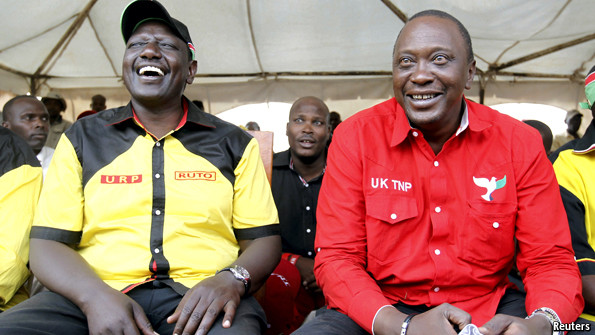It’s show time
The trial of Kenya’s President Uhuru Kenyatta
(pictured right) and his deputy William Ruto (left) could affect justice
and political stability at home and abroad
FIVE years after a violent election that drove Kenya to the brink of
civil war, some of the alleged leading perpetrators are at last to go on
trial. The first, on September 10th, is William Ruto, a leader of the
Kalenjin group, who was elected vice-president in March. A month or two
later it will be the turn of his boss, President Uhuru Kenyatta, a
leader of the Kikuyu tribe, who is being tried separately.
The two men stand accused of pitting their communities against each
other in campaigns of ethnic cleansing and murder in early 2008 that
left a good 1,300 people dead. But they teamed up last year to win
parliamentary and presidential elections held this March, partly by
stirring up national and tribal feeling against the International
Criminal Court (ICC) at The Hague, where they are to be tried.
Warnings from Kenya’s Western allies evidently had little effect on
the voters. As a result, their relations with Mr Kenyatta and his new
government have been frosty, though on a visit to London in May he did
meet Britain’s prime minister. Kenya seems quite cheery. In June the
World Bank said its economy “could be in a position for a take-off”.
With an indictee of the ICC riding so high, the court looks isolated as
it tries a sitting head of state for the first time.
Messrs Kenyatta and Ruto face long prison sentences if convicted.
Their trials may last several years and could keep Kenya’s leaders away
from government business for long, disruptive periods. Strains are
already showing. Some witnesses who had previously agreed to testify
against Mr Kenyatta are unwilling to do so now. Their reluctance has
resulted in the dropping of separate charges against Francis Muthaura,
the former head of the civil service, one of several other people
originally indicted.
Partisan coverage in some local papers has fostered the impression
that the cases against the two leaders have already been fatally
weakened. Readers are lapping it up. Since the election, opinion polls
show waning support for the prosecution. Approval rates for the ICC have
dipped from nearly 60% to less than 40%.
James Gondi, who campaigns for legal rights, says the country’s
leaders are conducting a “propaganda war” and parading themselves as
heroes defending their communities. But he still hopes that once the
trials get under way Kenyan consciences will be pricked by the gravity
of the charges against the president and his deputy.
The accused have not had it all their own way. Mr Ruto failed in his
application to have the hearings moved from the Netherlands to Kenya or
neighbouring Tanzania. A ruling on a similar appeal by Mr Kenyatta is
expected on September 7th. The defendants’ attempts to rally support at
the UN Security Council to have their cases dropped came to nothing.
African Union leaders have condemned the prosecution of two of their own
but none of the 34 African states that signed up to the Rome statute of
the ICC has withdrawn from it.
“A perception game is afoot,” says Elizabeth Evenson of Human Rights
Watch, a New York-based lobby, and so far the ICC has been doing badly.
The court looks feeble after dropping charges against one of the accused
and failing to protect witnesses. Kenyan victim groups say they have
been warned against watching the hearings on television. Mr Ruto is to
travel to The Hague with 100 MPs to show he has popular support. They
will try to force Kenya to withdraw from the Rome statute, though that
would not affect the trial. Judges must wonder if the accused will
eventually stop turning up, making a mockery of the new system of
international justice. Whether Kenya or the court would look more
isolated is moot.
Meanwhile, the ICC needs to bolster its credibility elsewhere. It
would help if war criminals outside Africa were brought before it; the
Balkan villains of the 1990s were tried under separate UN-sponsored
tribunals. While preliminary investigations are under way in Latin
America and the Middle East, they have so far failed to lead to
indictments, let alone convictions. This has allowed the court’s African
critics to accuse it of “race hunting”, even though most African cases
were referred to the ICC by African governments; Kenya’s consented. When
the ICC’s flamboyant chief prosecutor, Luis Moreno Ocampo, an
Argentine, stood down, he was replaced by a doughty Gambian lady, Fatou
Bensouda.
In any case, the ICC’s wheels of justice grind too slowly. The court
at The Hague, as distinct from the temporary tribunals that have judged
people in former Yugoslavia and Rwanda, has convicted only one person, a
Congolese warlord, Thomas Lubanga. That took six years. Some fear the
Kenyan trials may take even longer.
SCROLL DOWN TO LEAVE A COMMENT










No comments:
Post a Comment